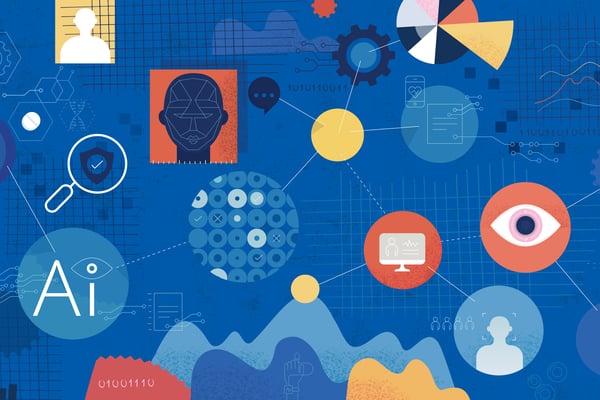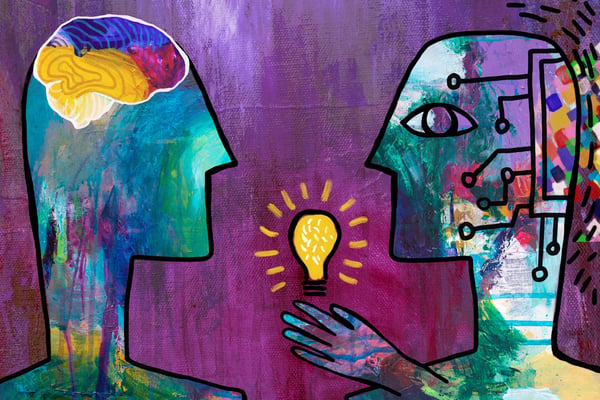Throughout history, new technology has reshaped our world. Today, we stand at the threshold of the artificial intelligence (AI) revolution. From the steam engine to the telephone, the airplane to the internet — each marked an inflection point that transformed our world in unprecedented ways. AI has the potential to change our society more significantly than any other technological advancement in human history. Seriously. No exaggeration.
Table of Contents
1.- Analyzing resistance to change
2.- Reasons for AI Skepticism
2.1. Job Loss
2.2. Lack of Understanding
2.3. Loss of Control
2.4 Ethical and Privacy concerns
2.5. Fear of Dependence
3.- Techniques for allaying fear
3.1. Education
3.2. Transparency
3.3. Ethical Guidelines
3.4. Pilot Programs
3.5. Inclusive decision-making
3.6. Highlight success stories
3.7. Cultivating AI ambassadors
Summary
Google CEO, Sundar Pichai remarks “[AI is] the most profound technology humanity is working on. More profound than fire.” Right around the corner, we will see the widespread integration of AI into our lives and organizations. Imagine what that means! In much the same way the internet once revolutionized our global communication and connectivity, AI promises to redefine not just how we do business but how we think, solve problems, and envision the future.
At DocuWare, we're not merely observing this revolution from the sidelines. We're passionately embracing AI, recognizing its potential to redefine the landscape of how organizations work, including our own company.
As I spearhead a strategic initiative to usher AI into DocuWare’s operations, I feel a surge of excitement. But just as with any groundbreaking change, the path is paved with challenges. AI, despite its boundless potential, also presents unique hurdles, including widespread fear, uncertainty, and mistrust.
The resistance surrounding AI is reminiscent of attitudes expressed during other technological revolutions. Just as there were skeptics who questioned the benefit of electricity, doubters voice their reservations today. But it's vital to understand that AI skepticism prompts us to ask essential questions, to evaluate the implications, and to react with both enthusiasm and caution.
With that in mind, let's delve into the specifics of incorporating AI into your business, understanding the roots of uncertainty, and exploring how to navigate this brave new frontier.
1.- Analyzing resistance to change

Introducing AI into a company is not just about the technology but also about the human side of things. One common challenge is overcoming the skepticism that many employees have toward AI.
Technophobia around emerging technologies is not new. American philosopher Henry David Thoreau expressed his mistrust of the telegraph, "We are in great haste to construct a magnetic telegraph from Maine to Texas; but Maine and Texas, it may be, have nothing important to communicate." Yet, as history unfolded, the interconnectedness facilitated by the telegraph proved vital in shaping the nation's political, economic and social landscapes.
Similar widespread misgivings existed around the invention of electricity, elevators, airplanes, television, microwave ovens, and the internet. This anxiety runs deep in the human psyche.
While these feelings might seem old-fashioned, it's essential for modern organizations not to dismiss or belittle such concerns surrounding AI. Instead, they should approach these fears with empathy and a sincere intention to understand them. Just as with past innovations, these emotions stem from genuine concern about societal and individual implications. By acknowledging and addressing these issues, organizations can pave the way for smoother transitions and more robust integrations. In doing so, it's crucial to delve deep into the root causes. Let's explore the primary reasons behind the hesitancy toward your company’s use of AI.
2.- Reasons for AI skepticism

2.1. Job loss
The fear of AI taking over human jobs is deeply rooted in the idea that automation will make human skills obsolete. This concern isn't just limited to manual tasks but also to knowledge-based roles. As AI systems become more sophisticated, there's an increasing worry that they might outperform humans in tasks traditionally considered "safe" from automation. Such fears are often amplified by the media which focuses on worst-case scenarios, making it even more important for organizations to communicate the actual purpose and limits of AI integration.
2.2. Lack of understanding
AI is, without a doubt, a complex field, and its intricacies can be daunting. People who don't understand how AI makes decisions might feel left out or sidelined. For many, this lack of understanding translates into distrust, leading them to question AI-driven processes' accuracy, reliability, and fairness.
2.3. Loss of control
The idea of machines making decisions on our behalf is unsettling. This stems from the fear that we might relinquish control to entities that operate on logic we don't fully understand. There's also an underlying concern about the unpredictability of AI. The consequences could be significant if an AI system makes a mistake or behaves unexpectedly. The feeling of ceding control, especially in critical decision-making processes, naturally provokes resistance.
2.4. Ethical and privacy concerns
There are worries about bias in AI algorithms, which may perpetuate societal prejudices. Then, there's the issue of surveillance and misuse of personal data. With AI's capability to process vast amounts of information, there's a fear that it could be used in ways that compromise individual privacy or are ethically questionable. These concerns highlight the need for robust ethical frameworks around AI development and deployment.
2.5. Fear of dependence
Relying heavily on any technology, let alone something as influential as AI, brings forth concerns about over-dependence. The worry is that as we lean more on AI for tasks, we might lose essential human skills or become too reliant on technology. Moreover, there's the underlying question: What happens if the technology fails or is compromised? A society or organization too dependent on AI might find itself vulnerable.
By addressing these concerns in detail, organizations can create a more receptive environment for AI integration, ensuring that its benefits are realized while minimizing potential pitfalls.
3. Techniques for allaying fear
.jpg?width=600&height=400&name=iStock-1479183112%20(1).jpg)
3.1. Education and training
Knowledge is power. By providing workshops, seminars, and training sessions focused on AI, organizations can dispel myths and address misconceptions. Such initiatives empower employees to harness the benefits of AI. When employees see AI as a tool rather than a threat, their resistance lessens, and their confidence grows.
3.2. Transparency
Hidden agendas breed mistrust. It's essential for organizations to be transparent about their reasons for adopting AI. If the primary goal is to augment human abilities rather than replace them, this should be communicated clearly. Offering insights into how AI systems work and make decisions can also help to dispel fears and build trust.
3.3. Ethical guidelines
By putting clear guidelines and standards for AI's use in place, companies can show their commitment to ethical and responsible AI deployment. Such guidelines can address potential biases, misuse of data, and ensure that AI performs in ways consistent with company values.
3.4. Pilot programs
Experiencing AI firsthand can break down many barriers. Introducing AI through pilot programs allows employees to interact with the technology on a smaller scale, demystifying its operation and showcasing its benefits. It also offers an opportunity for feedback, ensuring that any subsequent broader rollouts are more refined and aligned with user needs.
3.5. Inclusive decision-making
Empowerment comes from involvement. When employees are included in the decision-making processes around AI – from selection to deployment – they feel a sense of ownership and control. Their firsthand experiences and insights can help shape a more effective AI strategy, and their participation fosters a more collaborative and accepting environment.
3.6. Highlight success stories
Narratives can shape perspectives. Sharing stories of how AI has positively impacted job roles, improved efficiencies, or brought about innovative solutions can inspire and encourage. By showcasing real-world examples, employees can better visualize the potential benefits of AI in their specific roles and the broader organization.
3.7. Cultivating AI ambassadors
Change often begins with a few champions. Identifying and nurturing AI Ambassadors can be pivotal in driving AI acceptance. These ambassadors should understand the potential benefits of AI and be passionate about its promise. They can communicate its advantages to their peers. By translating AI benefits into relatable terms and sharing experiences across departments, they help foster a positive and informed perception of AI, driving broader acceptance and enthusiasm.
Summary

As organizations stand on the cusp of another significant technological shift, the lessons from history are clear: skepticism and fear are natural reactions to change. Yet, it's through understanding, transparency, and inclusion that these fears are most effectively addressed. The introduction of AI is not merely a technological endeavor but a human one. It intertwines with our emotions, aspirations, and apprehensions.
In addressing AI concerns, we're reminded that the human element is at the heart of every technological advances. The tools and machines we create are extensions of our will, designed to augment our capabilities and improve our lives. Just as Thoreau's skepticism about the telegraph was alleviated by its tangible societal benefits. Modern fears about AI can also be calmed by familiarity with real-world applications that enhance human potential.
Organizations can navigate this transformational journey with grace by being proactive, empathetic, and inclusive. By leveraging education, fostering transparency, establishing ethical guidelines, and celebrating AI's successes, we can demystify this powerful technology. And in doing so, we'll harness AI's vast potential and cement the foundational truth that technology, at its best, is a tool in service to humanity.
In the end, the true measure of AI's success will not just be in its algorithms or capabilities, but in its ability to integrate into our shared human experience. As we embrace AI, let's ensure we're guided by both innovation and empathy.







.jpg?width=600&height=400&name=iStock-1479183112%20(1).jpg)

